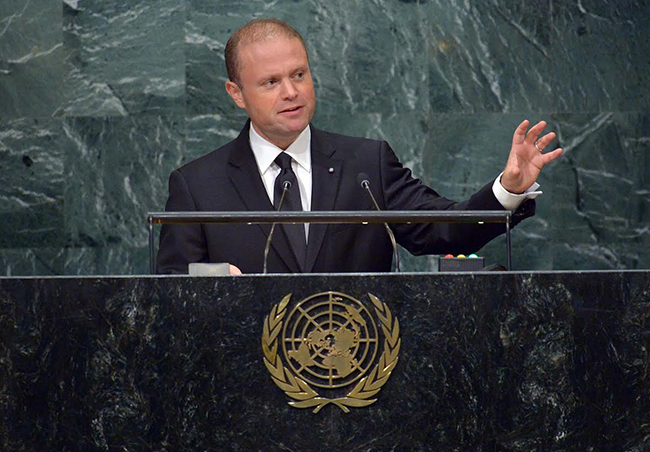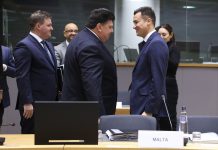Prime Minister Joseph Muscat addressed the 71st UN General Assembley in New York with migration and combating terrorism the main focus of his speech.
Full speech below:
Mr President
Please allow me to join my colleagues in expressing my country’s deepest gratitude and appreciation to Secretary General Ban Ki Moon for his sterling work.
This 71st Session of the General Assembly is marked primarily by the High Level Meeting on the large movement of refugees and migrants. The outcomes of this meeting will spur us to work further to address this huge movement of people, the likes of which we have not seen since World War II.
Last year this gathering had considered that migration had reached crisis levels. Today we are increasingly realising that this phenomenon is set to become “a new normal” that needs to be managed. Despite the difficult debates, discussions, stumbling blocks and widely divergent viewpoints, it is encouraging to see how far we have come and how much we have found that which truly unites us, underpinned by the most fundamental principles of saving lives and upholding human dignity. Nevertheless, the proof of the pudding is in the eating, and I must confess I am still doubtful that all the soft words will be met by hard facts. Despite this, we owe it to everyone to give it a try.
We need to respond to this challenge, not with fear, not with dread, not by closing ourselves within walls. But with tenacity, conviction and compassion. This is what drives my country time and again to push for migration to be high on the agenda.
Together with our European partners, and sometimes on our own or almost, Malta has been working tirelessly to address the common concerns and challenges being presented. Key in this respect are international efforts to address migrant smuggling and human trafficking through measures aimed at disrupting the business models of criminals who harbour a total disregard for human life and profit from other people’s tragedies. Though commendable, these efforts however need to be stepped up. Sharing of information, improved implementation of national enforcement policies and stronger penalties to punish smugglers, are essential dimensions to effectively address this challenge.
I believe people smugglers are in the same category of the same of the worst type of criminals, and must be treated as such. We should seriously consider a structure where these traffickers are brought to justice in front of an international tribunal in order to drive home the message that we are not only looking at this tragedy from the humanitarian aspect, as it should be, but also from the security perspective, and that profiting from human trafficking does not pay.
Malta also believes that there is no such thing as a unilateral solution to this phenomenon. A global perspective is required. Closer cooperation is essential for and amongst the countries of origin, transit and destination. This was the focus of the Valletta Summit on Migration which we were proud to host last November in Malta, when European and African Leaders met to see what we can do together and for each other.
Having now engaged in the Secretary General’s High Level Event, I am immensely pleased and encouraged to see that the outcomes and spirit of the Valletta Summit live on, at least in words and intentions. Most actions unfortunately still need to follow. As I have said, steps now need to be taken especially by those countries that bear the moral responsibility for mass movements, either through their actions or lack of them.
Somali poet Warsan Shire writes in her poem Home that “No one puts their children in a boat unless the water is safer than the land.” My country’s vision is that of a safe Mediterranean region which offers peace, wealth, stability and work.
The situation in the Middle East has a huge bearing on that of our region and the whole world. It pains me to dwell on the fact that we are still nowhere near a solution to the Middle East Peace Process.
Malta is deeply concerned about the lack of progress towards a just and lasting peace in the region. The humanitarian situation in Gaza remains dire and we call on all parties to change the political, security and economic structure including the end of the closure and a full opening of the crossing points to assist Palestinians in Gaza rebuild their lives.
On the other side of the fence, Malta continues to maintain that the legitimacy of the State of Israel to exist must not be called into question and believes that Israelis have a right to live in peace within secure borders.
With a clear view on the rights of the Israelis and Palestinians, my country thus continues to back initiatives aimed at rekindling the prospects of peace talks and to keep the two-state solution alive.
But in so doing, we acknowledge that there is the need to create the right conditions to rebuild trust as a means of bringing back the two parties to the negotiating table. To achieve this, both sides must take bold steps, and refrain from all actions that undermine progress in the resumed peace talks.
Malta supports international efforts aimed at creating new dynamics around the Middle East Peace Process that would build upon other efforts towards a lasting solution, including the Arab Peace Initiative and the French Initiative. We hope that there will be the right traction to create the conditions for a lasting and durable solution.
In our most immediate neighbourhood, Malta has been and will continue to support its neighbour Tunisia towards stability and democracy. Despite facing serious challenges, Tunisia is gradually emerging as the first, albeit fragile, Arab democracy. But for it to succeed, it is important that Tunisia is not abandoned by the international community right at this critical juncture. Yet while Tunisia offers hope, the overall picture in Libya continues to be bleak. Nevertheless, I must remark the important, incremental positive developments.
We have managed to come a considerable way since the Skhirat talks last December and Malta commends and continues to support the hard work of the UN and its Special Representative for the unrelenting efforts and perseverance to improve the political scenario for a stable and democratic Libya. We also welcome the recent adoption of Security Council Resolution 2298 allowing for the destruction of chemical weapons that are present in the country. It is a commendable effort aimed at reducing the risk that these weapons fall in the hands of extremists.
In spite of the progress however, the situation remains fragile. The Libyan population needs a concretely functioning Government that addresses their basic needs – proper medication, food security and education. We stand behind the Libyan people’s efforts to transform Libya into a safe, democratic, and unified state, with a reconciled people, where state authority and the rule of law are restored. I am certain that this is the dream of the Libyans themselves.
We reiterate the need to remain supportive of the Libyan Peace Accord and the Presidency Council, while respecting Libyan sovereignty and taking into account Libyan ownership.
This has been a year of atrocious, terrorist acts against innocent victims – bystanders, men, women and children who have been killed while going about their daily lives, going to work, taking a stroll, eating with family, praying. A year that saw a rise in the spread of a culture of violence and death that crosses continents and peoples of whatever gender, race or creed. No religion and no discrimination can ever be a defensible cause for maiming, terrorising, and killing others.
A global society which is truly determined to counter all facets of terrorism must rise above prescriptive pronouncements and take action. In this regard, Malta believes that the United Nations is central in the global fight against terrorism. As host to the International Institute for Justice and the Rule of Law, Malta believes that the most effective way to counter terrorism is by empowering the rule of law and strengthening the judiciary in the states where such activity is gaining ground. This is what this centre is doing, without much fanfare, each and every day.
All of these aspects are priority areas for Malta which is currently Chair-in-Office of the Commonwealth, and looking forward to holding the Presidency of the Council of the European Union during the first half of next year.
As we near this milestone in our political history, Malta continues to successfully broaden its foreign policy focus. While our neighbourhood will naturally remain among the leading priorities for the months and years to come, Malta seeks to intensify its outreach to other regions and countries that present potential for further exchanges. The overriding driving force of our global perspective is oriented towards dialogue and mutual understanding– a vocation that Malta has been genuinely adhering to for decades.
As I noted, Malta is deeply committed to Euro-Mediterranean dialogue and cooperation, inspired by our long lasting policy, forged by former Prime Minister Dom Mintoff, the principle that there can be no peace and security in Europe without peace and security in the Mediterranean. We believe that this was never more true than today, and that we can once again add that today it can be broadened and there can be no peace and security in the world without peace and security in the Mediterranean. This vision will be a primary driving force behind Malta’s Presidency of the Council of the European Union. Countries bordering the Southern Mediterranean shores are facing serious challenges ranging from conflict to terrorism, to extremism and radicalisation. These are all challenges that cannot be addressed by individual countries and which require concerted resolve and action.
Apart from ensuring ownership of this cause by all stakeholders in the region, Malta will also promote the fostering of better synergies between regional Mediterranean mechanisms – including the 5+5 and the Union for the Mediterranean as well as the Anna Lindh Foundation– to address threats and achieve shared goals. The Maltese Presidency will endeavour to continue strengthening relations with the League of Arab States with the aim of consolidating the institutionalisation of relations. We will also continue to actively support the revitalisation of relations with the Gulf States through the Gulf Cooperation Council, which would serve as another opportunity for stepping up multi-level regional cooperation with the European Union.
Over the past 70 years the United Nations have striven to work together to achieve peace and security, development and human rights. In spite of the atrocities we have witnessed this past year, we must continue to hold on to these principles. We must not allow fear to be the driving and at times paralysing force. And we must continue to keep in mind the larger picture: to recognise that our diversity is our strength; that to understand each other fortifies our progress; and that one people’s concerns are collectively our concerns.
Malta shall continue to play its part within this Organisation to contribute, support and advance its initiatives and to foster new ones for the common good.
Photo DOI









